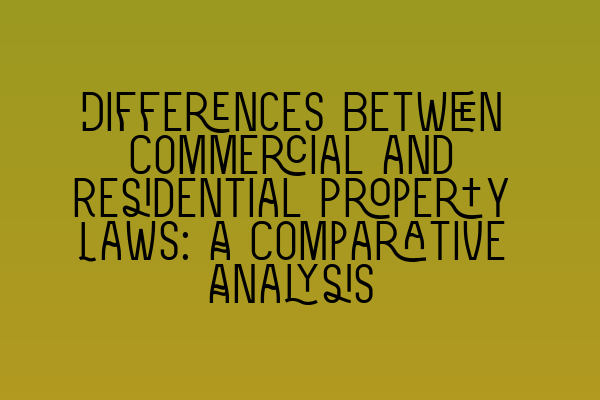Differences Between Commercial and Residential Property Laws: A Comparative Analysis
When it comes to property law, there are significant differences between commercial and residential properties. As a solicitor specializing in property law at SQE Property Law & Land Law, it is crucial to understand these differences in order to provide the best legal counsel and advice to our clients. In this blog post, we will delve into the various aspects that set commercial and residential property laws apart.
Before we dive into the comparative analysis, it is essential to define commercial and residential properties. Commercial properties are primarily used for business purposes, such as offices, retail stores, industrial buildings, and warehouses. On the other hand, residential properties are designated for personal living, such as houses, apartments, condos, and townhouses.
1. Purpose of Use:
The foremost distinction between commercial and residential properties lies in their purposes of use. Commercial properties are intended for commercial activities, where individuals or businesses conduct their operations, offer services, or sell goods. In contrast, residential properties are exclusively meant for private dwelling and habitation.
2. Legal Framework:
Commercial and residential properties are governed by different legal frameworks. Commercial property laws aim to regulate business activities, property leases, zoning regulations, and commercial property transactions. On the other hand, residential property laws focus on tenancy agreements, leasehold rights, eviction procedures, and residential conveyancing.
3. Landlord-Tenant Relationship:
The relationship between landlords and tenants is another area where commercial and residential property laws differ. In commercial properties, lease agreements are typically more complex and often involve longer lease terms. Commercial tenants usually have greater negotiating power and may be more involved in customizing their leased spaces to fit their business needs.
In contrast, residential properties often have shorter-term lease agreements, typically of one year or less. Residential tenants possess greater statutory protections, including regulations surrounding rent increases, eviction procedures, and habitability standards.
4. Leases and Tenancy Agreements:
Commercial leases tend to be more detailed and comprehensive compared to residential leases. Commercial leases outline numerous provisions, such as the permitted use of the property, maintenance responsibilities, rent escalations, renovation rights, and dispute resolution mechanisms. These leases offer more flexibility to landlords and tenants, allowing them to negotiate terms as per their specific requirements.
Residential tenancy agreements, on the other hand, are usually governed by local tenancy laws, which impose certain rights and obligations on both landlords and tenants. These agreements focus on rent, maintenance, occupancy limits, security deposits, and termination notice periods.
5. Rent Determination:
Rent determination is a crucial aspect that distinguishes commercial and residential properties. In commercial properties, rent is primarily determined based on the earning potential of the business or the property’s market value. Factors such as location, size, condition, and overall market demand influence the rent pricing strategy.
Residential properties, however, are subject to rent control regulations in many jurisdictions. These regulations limit the amount by which landlords can increase rents and ensure that the rental market remains affordable for tenants.
6. Legal Remedies:
In the case of disputes or breaches of lease agreements, legal remedies differ between commercial and residential properties. Commercial property disputes often involve complex litigation processes and may result in financial settlements, injunctions, or specific performance orders.
Residential property disputes are typically resolved through less formal means, such as mediation or arbitration. In severe cases, eviction proceedings may be initiated, following proper legal notification procedures aligned with local residential laws.
Understanding these fundamental differences in property laws is crucial for solicitors specializing in property law. At SQE Property Law & Land Law, our team of experienced property solicitors is well-versed in both commercial and residential property matters, enabling us to provide comprehensive and tailored advice to our clients.
If you’re preparing for the SQE exams, don’t forget to check out our related articles:
– SQE 1 Practice Exam Questions
– SQE 1 Practice Mocks FLK1 FLK2
– SQE 2 Preparation Courses
– SQE 1 Preparation Courses
– SRA SQE Exam Dates
To conclude, commercial and residential properties are subject to different legal frameworks, lease agreements, and rental mechanisms. Whether you are a commercial property owner or a residential tenant, understanding the distinctions between commercial and residential property laws is essential. At SQE Property Law & Land Law, we offer expert legal assistance and advice to guide you through the complexities of property law, ensuring that your rights and interests are protected.
